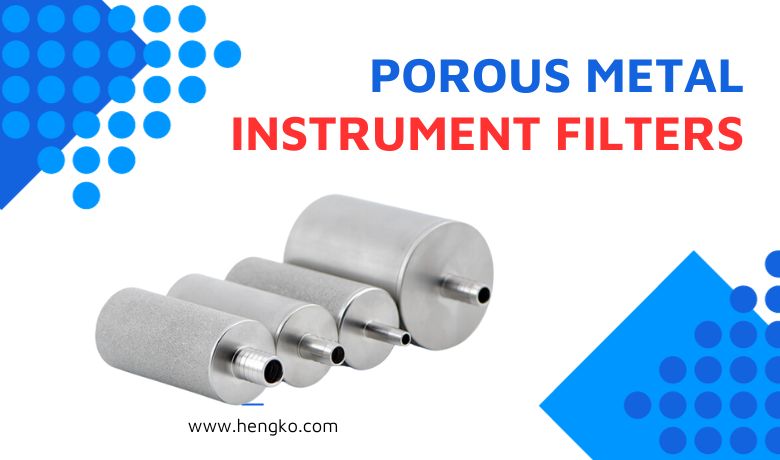-
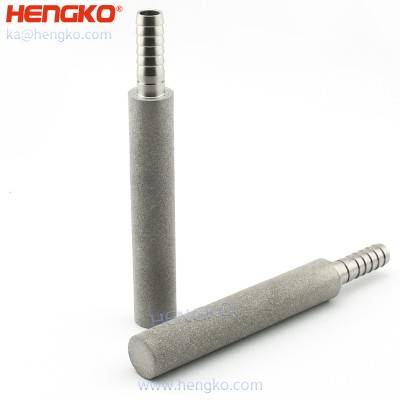
Stainless Steel Ozone Diffuser Stone Fine Air Sparger for Hydrogen Generator
Hydrogen water is clean, powerful, and with hydron. It helps to purify the blood and gets blood moving. It can prevent many kinds of diseases and improve peo...
View Detail -
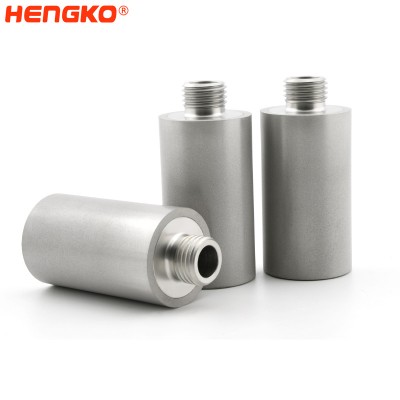
Stainless Steel Aeration/Oxygen CO2 Diffusion Stone Micro Sparger for Microalgae Cultiv...
Micro-diffuser for Microalgae Cultivation, Photobioreactors & sintered sparger for microalgae cultivation is used in laboratories for growing algae. HEN...
View Detail -
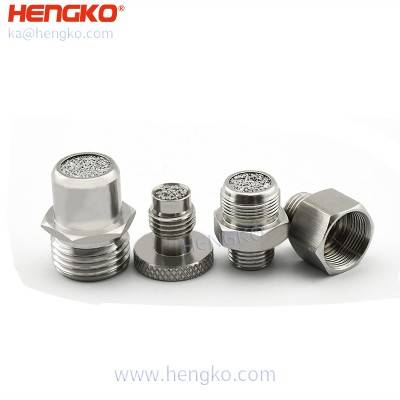
High flow non-invasive ventilator Inspiratory Bacteria Filter air inlet medical grade ...
HENGKO's filter element of the ventilator is stainless steel 316, stainless steel 316L, which has the characteristics of filtering and dustproof. Its materia...
View Detail -

High flow non-invasive ventilator circuit bacteria air inlet medical grade 316L stainl...
HENGKO's filter element of the ventilator is stainless steel 316, stainless steel 316L, which has the characteristics of filtering and dustproof. Its materia...
View Detail -
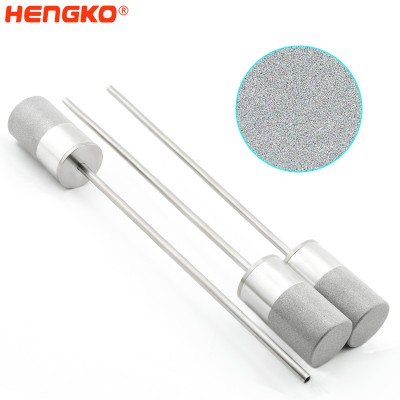
Biotech Removable Porous Frit Micro Sparger for Mini Bioreactor System and Fermentors
Stainless steel sparger used as a cell retention device. The device consists of a metal tube and a sintered metal filter with a pore size of 0.5 – 40 µm. The...
View Detail -
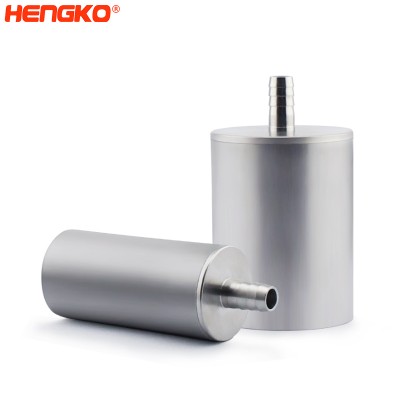
sintered sparger brewing carbonation wort aeration wands (Pure Oxygen) system for homeb...
HENGKO SS air stone is commonly used to aerate the wort before fermentation, which helps ensure a healthy start to the fermentation process. The HENGKO 2.0 m...
View Detail -
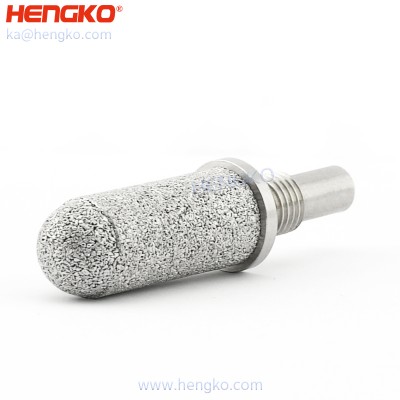
Sintered Metal Sparger of Stainless Steel Porous Sparger Types for Home Brewing Device
HENGKO sintered spargers introduce gases into liquids through thousands of tiny pores, creating bubbles far smaller and more numerous than with drilled pipe ...
View Detail -
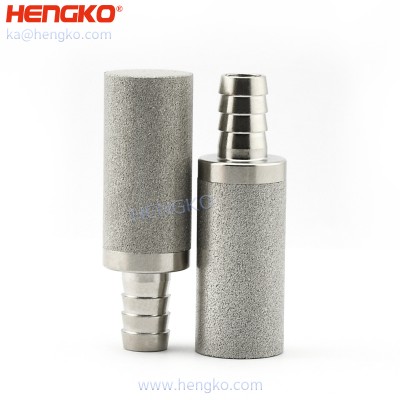
Stainless Steel Sparger 2 Micron Stainless Steel Carbonation Diffusion Stone for Bacter...
Introducing HENGKO's innovative sintered spargers - the ultimate solution for efficient gas-liquid contact in a variety of industries. Our spargers use thou...
View Detail -
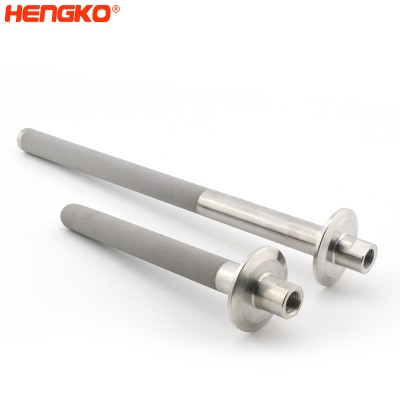
Installed Directly Porous Metal In-Line Sparger Tube Generate Small Bubbles
HENGKO sintered spargers introduce gases into liquids through thousands of tiny pores, creating bubbles far smaller and more numerous than with drilled pipe ...
View Detail -

Sintered porous micron stainless steel spargers homebrew wine wort beer tools bar acces...
HENGKO sintered spargers introduce gases into liquids through thousands of tiny pores, creating bubbles far smaller and more numerous than with drilled pipe ...
View Detail -
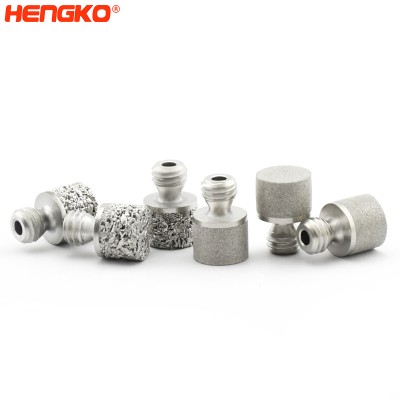
Micro Spargers Increase Gas Transfer and Improve Upstream Reactor Yields for Bioreactors
Introducing HENGKO sintered spargers - the ultimate solution to introduce gases into liquids with ease! Our innovative spargers feature thousands of tiny po...
View Detail -
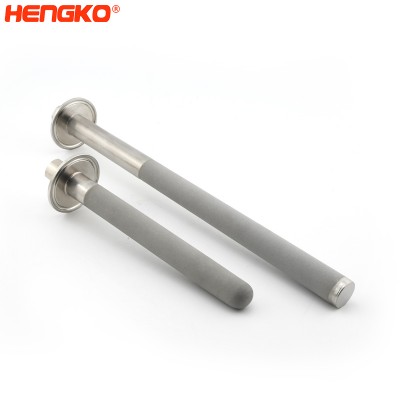
Metal In-Tank Porous Spargers to Increase Gas Absorption
HENGKO sintered spargers introduce gases into liquids through thousands of tiny pores, creating bubbles far smaller and more numerous than with drilled pipe ...
View Detail -
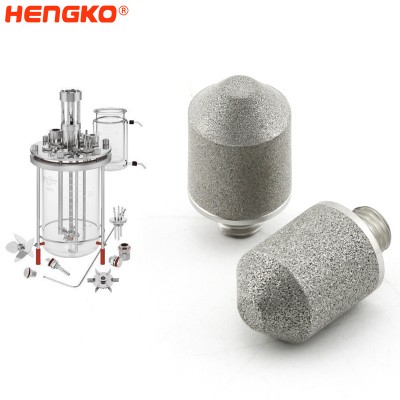
Micro spargers bubble air aeration stone for bioreactor assembly
Micro spargers from HENGKO reduce bubble size and increase gas transfer to reduce gas consumption and improve upstream reactor yields. HENGKO spargers can in...
View Detail -
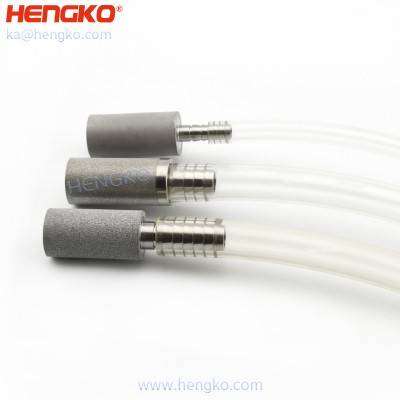
Sintered stainless steel 316L micro air sparger and brewing diffuser carbonation ozone ...
Product Name Specification SFB01 D1/2''*H1-7/8'' 0.5um with 1/4'' Barb SFB02 D1/2''*H1-7/8'' 2um with 1/4'' Barb SFB03 D1/2''*H1-7/8'' 0.5u...
View Detail -
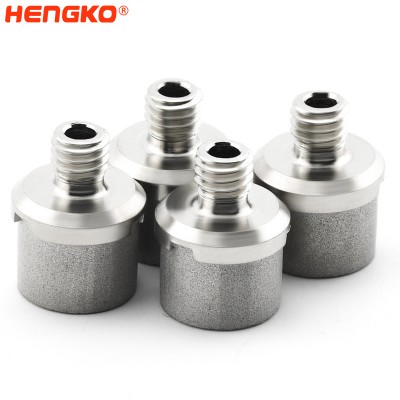
316L stainless steel porous sparger tube sintered tip for fermentation vessel accessories
Attaches to the tip of the sparger tube, this 316L stainless steel sintered tip is available in a variety of pore sizes. The 5 10 15 50 100 pore frit is the ...
View Detail -
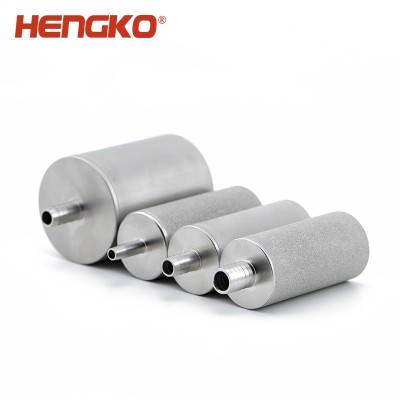
SFB02 2 microns sintered stainless steel micro porous air diffusers spargers used in me...
Product Name Specification SFB02 D1/2''*H1-7/8'' 2um with 1/4'' Barb HENGKO carbonation stone is made of the food grad...
View Detail -

Nitrogenous wine Tool Diffusion Professional Effective Aeration Stone Beer Brewage 316L...
Product Name Specification SFB01 D1/2''*H1-7/8'' 0.5um with 1/4'' Barb SFB02 D1/2''*H1-7/8'' 2um with 1/4'' Barb SFB03 D1/2''*H1-7/8'' 0.5um...
View Detail -
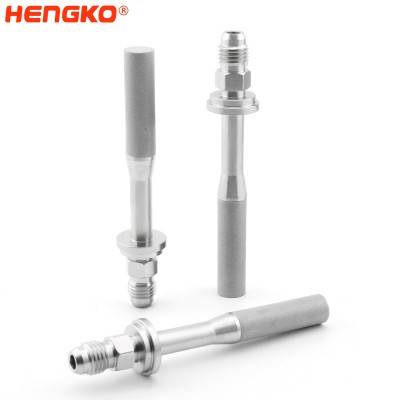
316L Stainless Steel 2µm Sparger Pipe for Fine Gas Diffusion in Tanks & Reactors
HENGKO stainless steel sparger pipe is designed for efficient gas diffusion—especially in hydrogen water systems where clean and stable microbubble generati...
View Detail -

SFC02 2 micron MFL Carbonation Sparger Inline Diffusion Stone for bubbling water/Bubble...
Hydrogen water is clean, powerful, and with hydron. It helps to purify the blood and gets the blood moving. It can prevent many kinds of diseases and improve...
View Detail -
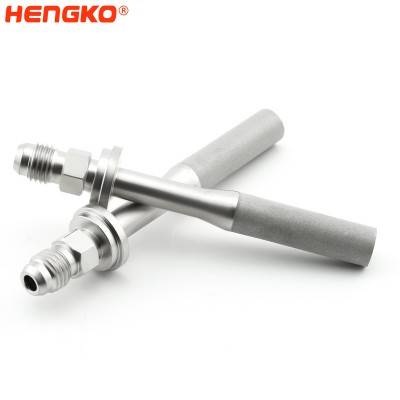
Inline 2µm Carbonation Diffusion Stone MFL Sparger for Bubbled Water & Beverage Ae...
Hydrogen water is clean, powerful, and with hydron. It helps to purify the blood and gets the blood moving. It can prevent many kinds of diseases and improve...
View Detail
What is Instrument Filter ?
An "instrument filter" is a broad term that can refer to any filtering component or device integrated within an instrument or system to purify, segregate, or modify the input or output of that instrument. The primary purpose of such filters is to ensure the accurate and reliable operation of the instrument by removing unwanted noise, contaminants, or interferences.
The specific nature and function of an instrument filter can vary widely depending on the context:
1. In Analytical Instruments:
Filters can remove undesired frequencies or noise from a signal.
2. In Medical Instruments:
They can prevent contaminants from entering sensitive areas or ensure the purity of a sample.
3. In Environmental Sampling Instruments:
Filters might trap particulates while allowing gases or vapors to pass through.
4. In Pneumatic or Hydraulic Instruments:
Filters can prevent dirt, dust, or other particulates from clogging or damaging the instrument.
5. In Optical Instruments:
Filters can be used to allow only specific wavelengths of light to pass through, thus modifying the light input to the instrument.
The precise function and design of an instrument filter depend on the instrument's purpose and the specific challenges or interferences it may encounter during operation.
What Kind of Instrument Will Use Metal Filter ?
Sintered metal filters are versatile tools due to their unique combination of strength, porosity, and temperature resistance.
Here are some instruments that utilize them, along with their specific applications:
1. Liquid Chromatography (HPLC):
* Use: Filters sample before injection into the column, removing particles that could damage the system or affect separation.
* Material: Typically stainless steel with pore sizes ranging from 0.45 to 5 µm.
2. Gas Chromatography (GC):
* Use: Protect injector and column from contaminants in gas samples, ensuring accurate analysis.
* Material: Stainless steel or nickel with pore sizes between 2 and 10 µm.
3. Mass Spectrometry (MS):
* Use: Filter sample prior to ionization to prevent clogging the source and affecting spectra.
* Material: Stainless steel, titanium, or gold with pore sizes as small as 0.1 µm.
4. Air/Gas Analyzers:
* Use: Sample pre-filters for environmental monitoring instruments, removing dust and particulates.
* Material: Stainless steel or Hastelloy for harsh environments, with larger pore sizes (10-50 µm).
5. Vacuum Pumps:
* Use: Protects pump from dust and debris in the intake line, preventing internal damage.
* Material: Sintered bronze or stainless steel with large pore sizes (50-100 µm) for high flow rates.
6. Medical Devices:
* Use: Filters in nebulizers for medication delivery, removing impurities and ensuring safe administration.
* Material: Biocompatible materials like stainless steel or titanium with precise pore sizes for optimal drug particle size.
7. Automotive Industry:
* Use: Fuel filters in vehicles, removing contaminants and protecting engine components.
* Material: High-strength stainless steel or nickel with specific pore sizes for efficient filtration and long service life.
8. Food and Beverage Industry:
* Use: Filters in filtration equipment for beverages, juices, and dairy products, removing solids and ensuring clarity.
* Material: Stainless steel or Food-grade plastics with pore sizes depending on desired level of filtration.
Those are just a small sample of the instruments that utilize sintered metal filters. Their diverse properties make them suitable for a wide range of applications across various industries, ensuring efficient filtration and protection of sensitive equipment.
Why Use Porous Metal Instrument Filters ?
Using porous metal instrument filters offers several advantages in various applications due to their unique material and structural properties. Here's why porous metal instrument filters are preferred:
1. Durability and Longevity:
. Metal filters are robust and resistant to wear, ensuring a long service life. They can withstand harsh conditions, including high pressures and temperatures, better than many other filter materials.
2. Chemical Stability:
Metals, especially certain stainless steels or special alloys, are resistant to a wide range of chemicals, ensuring consistent performance in corrosive environments.
3. Cleanability and Reusability:
Porous metal filters can be cleaned and reused, making them cost-effective in the long run. Methods such as backflushing or ultrasonic cleaning can restore their filtering properties after they get clogged.
4. Defined Pore Structure:
Porous metal filters offer a consistent and defined pore size, ensuring precise filtration levels. This uniformity ensures that particles above a certain size are effectively trapped.
5. Thermal Stability:
They can operate effectively over a wide temperature range without losing structural integrity or filtration efficiency.
6. Biocompatibility:
Some metals, like specific grades of stainless steel, are biocompatible, making them suitable for medical or bioprocessing applications.
7. High Flow Rates:
Due to their structure and material, porous metal filters often allow for high flow rates, making processes more efficient.
8. Structural Strength:
Metal filters can withstand differential pressures and physical stresses, ensuring consistent operation even under challenging conditions.
9. Integrated Design Potential:
Porous metal elements can be integrated into system components like spargers, flame arrestors, or sensors, providing multifunctional capabilities.
10. Environmentally Friendly:
Since they can be cleaned and reused multiple times, their environmental footprint is reduced compared to disposable filters.
In summary, porous metal instrument filters are chosen for their durability, precision, and versatile performance characteristics, making them ideal for a wide range of demanding applications.
What Factors you should Care When OEM Sintered Porous Metal Instrument Filter ?
When engaging in OEM (Original Equipment Manufacturer) production of sintered porous metal instrument filters, several crucial factors need consideration to ensure product quality, consistency, and suitability for intended applications. Here are some essential factors to keep in mind:
1. Material Selection:
The type of metal used directly affects the filter's performance, durability, and chemical resistance.
Common materials include stainless steel, titanium, bronze, and nickel alloys. The choice depends
on the application's requirements.
2. Pore Size and Distribution:
The pore size determines the filtration level. Ensure that the manufacturing process can consistently
produce the desired pore size and distribution for the application.
3. Mechanical Strength:
The filter should have sufficient strength to withstand operational pressures and stresses without deformation.
4. Thermal Properties:
Consider the filter's performance under varying temperature conditions, especially if it will be used in high-temperature environments.
5. Chemical Compatibility:
The filter should be resistant to corrosion and chemical reactions, especially if exposed to aggressive chemicals or environments.
6. Cleanability:
The ease with which the filter can be cleaned and its ability to maintain performance after multiple cleaning cycles is crucial.
7. Manufacturing Tolerances:
Ensure precise manufacturing tolerances to maintain consistent product quality and fit within the intended instrument or system.
8. Surface Finish:
Surface roughness or any post-processing treatments can affect flow rates, adherence of particles, and cleaning efficiency.
9. Quality Assurance and Control:
Implement robust QA and QC procedures to ensure consistent product quality.
This includes testing for filtration efficiency, material integrity, and other relevant parameters.
Anyway, You can pay attention to these factors, OEMs can ensure the production of high-quality
sintered porous metal instrument filters that meet both their and their clients' expectations.
Looking for a reliable OEM solution for instrument filters? Trust in HENGKO's expertise.
Contact us now at ka@hengko.com to discuss your unique requirements and bring your vision to life!
FAQ
1. What is a sintered metal filter?
A sintered metal filter is a type of filter made by taking metal powders and pressing
them into a desired shape. This is then heated (or sintered) below its melting point,
causing the powder particles to bond together. The result is a porous but sturdy metal
structure that can be used for filtration purposes. These filters are known for their high
strength, temperature resistance, and excellent filtration efficiency.
2. Why choose sintered metal filters over other filtration materials?
Sintered metal filters offer several advantages:
* High Temperature Resistance: They can operate in high-temperature environments where polymer-based filters would degrade.
* High Strength and Durability: Sintered metals provide good resistance to abrasion and corrosion, making them suitable for harsh environments.
* Defined Pore Structure: The sintering process allows for precise control over pore size and distribution, ensuring consistent filtration performance.
* Chemical Resistance: They are resistant to a wide range of chemicals, making them versatile in various industrial applications.
* Cleanability: They can be easily backwashed or cleaned, extending the filter's operational life.
3. In what applications are sintered metal filters commonly used?
Due to their unique properties, sintered metal filters find use in diverse applications:
* Chemical Processing: Filtration of aggressive chemicals and solvents.
* Food & Beverage: Filtering syrups, oils, and other edible products.
* Gas Filtration: Separating contaminants from high-purity gases.
* Pharmaceuticals: Sterile filtration and venting applications.
* Hydraulics: Filtering hydraulic fluids to prevent system contamination.
* Instrumentation: Protecting sensitive equipment from particulate contaminants.
4. How are pore sizes determined in sintered metal filters?
The pore size in sintered metal filters is determined by the size of the metal particles used
and the conditions under which the sintering process takes place. By controlling these parameters,
manufacturers can produce filters with specific pore sizes and distributions, catering to specific
filtration needs. Pore sizes can range from sub-micron levels to several hundred microns.
5. How do I clean a sintered metal filter?
Cleaning methods depend on the type of contaminant, but common methods include:
* Backwashing: Reversing the flow of fluid to dislodge trapped particles.
* Ultrasonic Cleaning: Using ultrasonic waves in a solvent bath to remove fine particles.
* Chemical Cleaning: Soaking the filter in a suitable chemical solution to dissolve contaminants.
* Burn-Off or Thermal Cleaning: Subjecting the filter to high temperatures to incinerate organic contaminants.
It's essential to ensure that the filter material can withstand the temperatures used.
* Manual Cleaning: Brushing or scraping off larger particulates.
Remember always to refer to the manufacturer's guidelines when cleaning, as inappropriate cleaning methods can damage the filter.
6. How long do sintered metal filters last?
The lifespan of a sintered metal filter depends on the operating conditions,
such as the type of fluid, temperature, pressure, and contamination levels.
With proper maintenance and cleaning, sintered metal filters can have a long operational life,
often lasting several years. However, in extremely harsh conditions, the lifespan may be shorter,
necessitating regular checks and possibly more frequent replacements.
